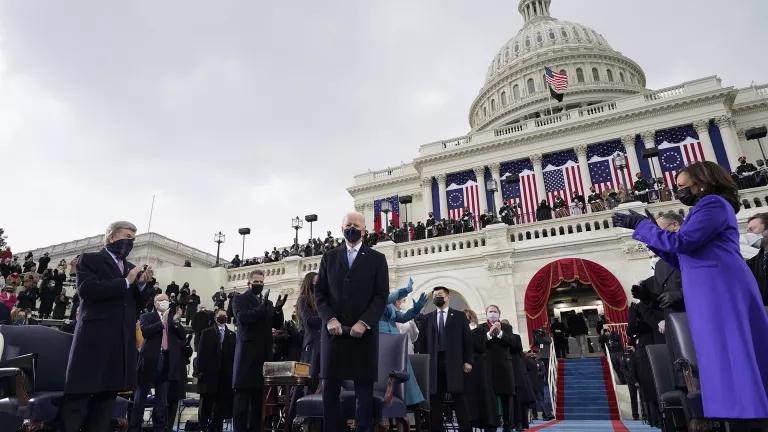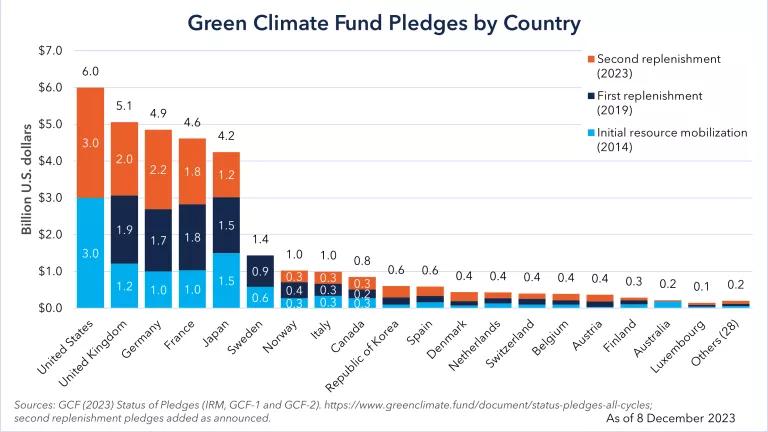America Is Back in the International Climate Effort

This marks the beginning of a drive toward more ambitious and just climate action in the country and around the world.
UPDATE: On Friday, February 19, 2021, the United States formally rejoined the Paris Agreement. President Biden has sent an unmistakable signal to the world that the United States is back—but now, we must be much bolder. As a top contributor to climate change, we have a moral obligation to help propel the world to a cleaner, safer, and more just and equitable future for all.
On their first day in office, the Biden/Harris administration took the initial step to rejoin global efforts to combat the climate crisis. As a part of his Day One announcements, President Biden moved forward with plans for the United States to formally reenter the Paris Agreement, reject the Keystone XL tar sands pipeline, and begin actions to reduce domestic emissions.
This will turn the page on a dark period of U.S. engagement on international climate change, as the last four years have been very difficult for the world. These announcements should be the beginning of a national mobilization to drive more ambitious and just climate action in the United States, while leveraging the full suite of America’s foreign policy tools to spur stronger actions around the world.
As President Biden said in his inaugural address: “A cry for survival comes from the planet itself. A cry that can’t be any more desperate or any more clear...We will repair our alliances and engage with the world once again. Not to meet yesterday’s challenges, but today’s and tomorrow’s. We will lead not merely by the example of our power but by the power of our example.”
First Steps Toward Greater Climate Action
In his first day in office, President Biden announced some steps to reassert America’s leadership on climate change.
Rejoin the Paris Agreement: President Biden formally notified the United Nations that the United States will reenter the Paris climate accord. Under the terms of the agreement, this will take effect in 30 days. The United States will no longer be a global climate pariah as the only country in the world to withdraw from this historic agreement. With this effort, the United States can now work with partners to drive the necessary greater action that we need if we are to avoid the worst impacts of climate change.
Reject Keystone XL: President Biden withdrew the cross-border permit for the Keystone XL tar sands pipeline that would have shipped the world’s dirtiest oil from Canada through the United States for decades to come. The scrapping of this disastrous project will support both Canadian and U.S. climate objectives by stalling the expansion of the tar sands climate catastrophe and reducing North America’s reliance on dirty fuels. Now the United States and Canada can focus on how to use their shared markets to work together to drive towards a zero emissions future.
Begin steps to reduce America’s emissions: President Biden issued several directives to begin efforts to reduce America’s domestic climate pollution, create jobs, protect human health, and save consumers money. The directives will begin the process under existing legal authority for reducing the emissions from America’s vehicles, oil and gas extraction, and energy consumed by buildings and appliances.
This will add new opportunities to reduce emissions created by the recent rejection by the courts of the efforts to undo carbon pollution limits for power plants, which clears the way for Biden's Environmental Protection Agency to quickly set standards that will effectively slash CO2 emissions from power plants. These orders also begin a review of a series of last-minute regulations that would move this country backward on climate policies and nature-based climate solutions.
These directives are just the beginning of the urgent actions that the U.S. government will need to take to clean up our country's own climate pollution so it can protect Americans and build credibility for international leadership.
U.S. Leadership Is Desperately Needed
The United States rejoins this global effort at a critical juncture. Over the last four years, we have seen a resurgence of bottom-up climate action with major states, cities, companies, and investors continuing to drive forward a low-carbon economy despite the inaction at the U.S. federal level. The market—which looks at cold, hard facts—sees clean energy as the smart financial investment choice and the leading edge of the economic driver for the coming decades. Yet U.S. and global action to date has not been enough to avert the worst impacts of climate change.
During the past four years, we’ve witnessed the reality that climate action must occur faster and at a deeper level than most policymakers were focused on. This is most evident in the recent Intergovernmental Panel on Climate Change report, which demonstrated the need to mobilize toward a global temperature increase of no more that 1.5°Celsius, which will require the world to reach net zero emissions no later than 2050. But it also rears its ugly head in the devastation that communities in the United States and around the world are suffering right now from extreme weather events fueled by climate change.

Mobilizing Climate Action With Conviction, Humility, and Assertiveness
As the United States reenters this global effort, it will need to do so with conviction, humility, and confidence. That means ensuring that the United States gets its own house in order with conviction by using all the tools at its disposal to drive America’s domestic emissions steeply downward in a just and equitable fashion. It will need to be humble by recognizing that the world has continued to advance on climate action, despite the last four years of U.S. delay at the federal level. But it will need to act assertively with the recognition that U.S. international leadership can help to unleash a wave of greater climate action in the major emitting countries and sectors.
This global effort can be centered around a Climate-First Foreign Policy, which drives climate action through all key countries, venues, sectors, and strategies (as we’ve outlined in more detail).
Just the Beginning of the Sprint
It is time to roll up our sleeves as the hard work starts. President Biden has begun this effort with some welcome first steps, but the journey will require us to be bolder, more innovative, and to deliver action more widely and effectively. This is just the beginning of what we hope will be more aggressive actions in the coming days, weeks, and months ahead.
Let’s get to work with the urgency that tackling the climate crisis demands. We have no time to wait.



